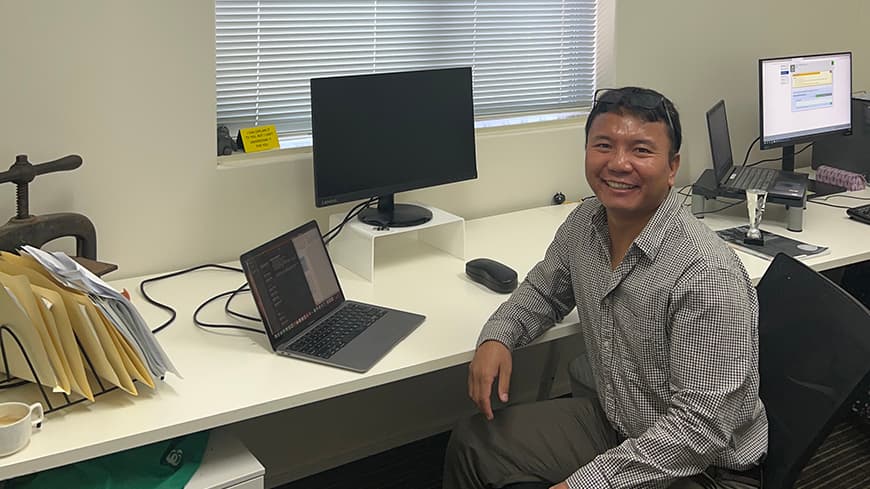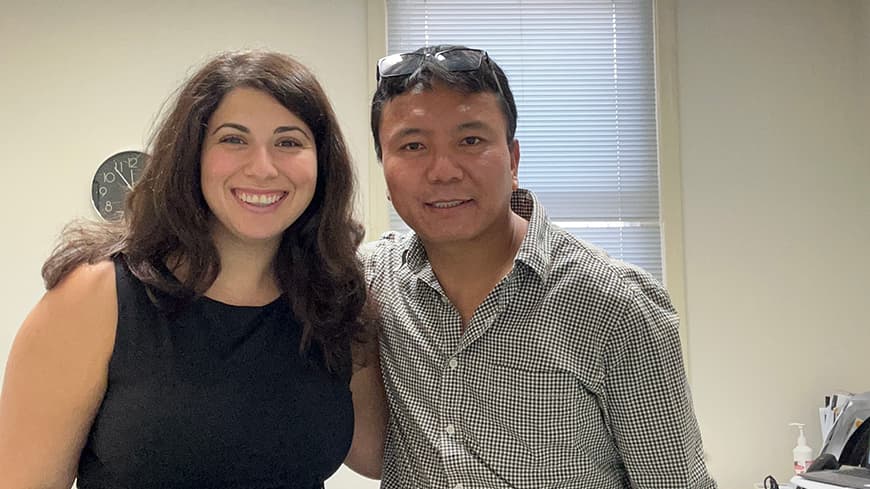Who doesn't love a mutually beneficial arrangement?
You host a PhD candidate as an intern for 3-6 months and they undertake a focused research project that's co-designed by you, an academic mentor and the intern.
Your intern gets valuable industry experience and builds their network while helping you explore new and innovative ways of thinking and emerging technology.
This helps you develop new ideas, products, and services for your organisation.
It's a win-win.
Here's a real example of a successful research internship.
Meet Kinley, PhD candidate and intern
Kinley Rinchen hails from Bhutan, in the heart of the Himalayas.
He was always curious about work cultures and working environments in other countries.
He also wanted a career switch.
To join a knowledge-based profession that entails research and scholarly works.
So Kinley decided to do a PhD in Australia at Edith Cowan University.
His PhD research aims to provide an overview of the holistic impact of COVID-19 on people, progress and prosperity in Bhutan.
At its heart is understanding the practices and application of promoting well-being in workplaces and communities.
 Kinley Rinchen, ECU PhD candidate and intern at Illuminate Minds, a private Psychology Practice.
Kinley Rinchen, ECU PhD candidate and intern at Illuminate Minds, a private Psychology Practice.
Meet Mina, psychologist and organisational consultant
Mina Hattom works for Illuminate Minds, a private psychology practice.
The practice decided to participate in the internship because they firmly believed that growth comes from embracing diverse perspectives and expertise.
And what better way to achieve this than through an internship?
Mina says this partnership allowed the business to collaborate with an eager, knowledgeable, and talented individual, fostering mutual growth and success.
What did Kinley make of the internship?
First up, he got a pleasant surprise.
He expected that he would be treated as a student wanting to learn from them.
Instead, the people at Illuminate Minds treated him as a colleague.
They also made sure his objectives were clarified at the beginning, along with the activities required to meet the objectives.
It made his work clear and easy to understand.
The internship built the foundation to develop a training package on self-leadership as a product to promote wellbeing – which Kinley saw as an emerging need in the aftermath of the COVID-19 pandemic.
This work has led to identification of a research area to carry out a comparative study on self-leadership training products between Australia and Bhutan.
How did Illuminate Minds benefit from the internship?
Mina says that Kinley brought exceptional research skills to their team, demonstrating proficiency in data collection, analysis, and synthesis.
He had a keen eye for detail, could identify key trends, and had a talent for presenting complex information in a clear and concise manner.
Importantly, Mina says that Kinley also brought enormous value to the organisation through his innovative ideas, feedback on their products, work ethic, and collaborative spirit.
And his ability to take on challenges with a fresh perspective paved the way for the development of a new product which they are currently working on.
What’s not to like there?
 Mina Hattom, psychologist and intern supervisor at Illuminate Minds, with Kinley Rinchen, ECU PhD candidate and happy intern.
Mina Hattom, psychologist and intern supervisor at Illuminate Minds, with Kinley Rinchen, ECU PhD candidate and happy intern.
How did Mina benefit from the internship?
Mina says the ability to mentor and guide a talented intern was incredibly fulfilling.
It allowed her to develop her leadership skills and share her expertise.
Supervising Kinley provided her with opportunities for professional growth, through exposure to new research methodologies and problem-solving techniques.
His high level of engagement and enthusiasm for the work was contagious, positively impacting team morale.
In summary
As an intern, Kinley says, "Doing an internship will help you learn a lot about your own subject areas, application of academic knowledge in an industry, and how to use your research skills at work.
"Also, you will make new friends, expand your network and learn a new work culture beyond the university campus."
As a supervisor, Mina was surprised by how mutually beneficial the experience was, not only for Kinley's development, but also for the enhancement of their business projects and for her own supervisory skills.
Mina received support from both her organisation and from Edith Cowan University's specialised Employability team.
She had regular check-ins around Kinley’s progress and many touchpoints with ECU to answer any questions she had throughout the internship.
Clearly the whole experience worked well for everyone.
To find out more about how your organisation might benefit from a PhD candidate research internship, contact Narelle Jones, Industry Programs and Curriculum Advisor at research_internship@ecu.edu.au

 PhD candidate interns get valuable industry experience and build their network while helping businesses explore new and innovative ways of thinking and emerging technology.
PhD candidate interns get valuable industry experience and build their network while helping businesses explore new and innovative ways of thinking and emerging technology.


